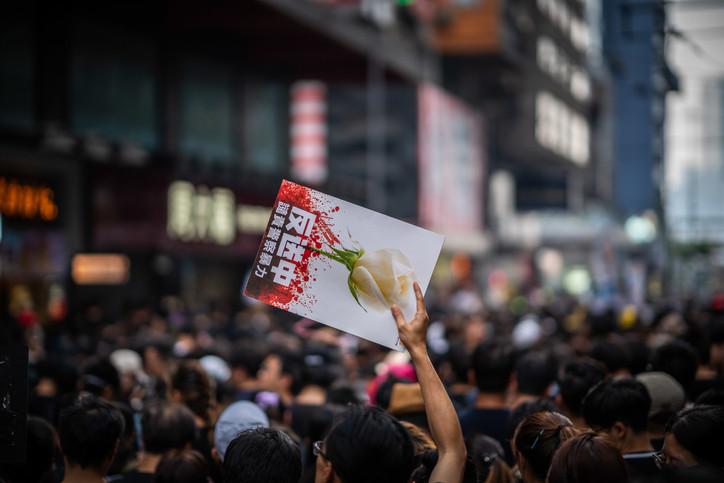In the United States, partisan polarization is at a high not seen since the mid nineteenth century. Democrats and Republicans are opposed on most basic issues, including the fundamental belief in democracy. However, one issue does seem to unite the parties: the threat that China presents to US hegemony.
Recently, the US Congress’s Select Committee on the Strategic Competition between the United States and the Chinese Communist Party (CCP) held its first hearing, titled “The Chinese Communist Party’s Threat to America?” One would be forgiven for not being able to distinguish the Republicans from the Democrats, since everyone on the committee had strong rhetoric about the threat the CCP presents for the US.
Simultaneously, the leadership in China stepped up their own bellicose rhetoric about the US. Without question, the relationship between the US and China has soured to such a degree that one can be certain that the era of engagement between the two countries is over.
Not only that, but the two countries are increasingly sliding toward what some are calling a “new Cold War,” where engagement has been replaced by antagonism bordering on potential conflict. A Cold War between the US and China would have serious implications for many global issues, not least of which is human rights.
The Chinese government’s threat to human rights
The threat that the Chinese government poses to human rights within China is well known and well documented. The silencing of dissent, overwhelming and constant surveillance, an autocratic political system, repression of ethnic minorities such as the Uyghurs, and the recent takeover of Hong Kong and shuttering of its democracy are some of the serious violations of human rights that the Chinese government has perpetrated.
What is perhaps less well known or well documented is the Chinese government’s impact on the international human rights regime. A recent report by Human Rights Watch highlighted the role that the Chinese government has taken to undermine the international human rights system. The report notes that, under Xi Jinping, “the Chinese government does not merely seek to neutralize U.N. human rights mechanisms’ scrutiny of China, it also aspires to neutralize the ability of that system to hold any government accountable for serious human rights violations.”
China’s rise as a potential hegemonic challenger to the US poses a serious and long-term threat to the international human rights regime. The Chinese government has long emphasized the importance of state sovereignty and the implementation of human rights “in context” or according to the development status of each country. In the abstract this is not objectionable, but in practice it is only used as an excuse to not implement civil and political rights. Additionally, as Rhoda Howard-Hassmann notes, state sovereignty is “the single largest legal and practical impediment to universal human rights.”
A Cold War between the US and China has the potential of fracturing the liberal international order, including the human rights system. Although the US often views itself exempt from international law and international human rights treaties it also, often hypocritically, seeks to hold other countries accountable to international law.
The Chinese government’s oversized emphasis on state sovereignty can only seek to undermine the further development of human rights internationally. Furthermore, Chinese foreign policy could attract more countries to their sphere of influence with promises, whether kept or not, of noninterference in their domestic affairs. One sees this happening to a certain degree with some of the Chinese international economic efforts, such as the Belt and Road Initiative and the Asian Infrastructure Investment Bank, which both minimize the focus on rights-based development in contrast to other international economic lenders.
Early indicators also suggest some dissatisfaction with these Chinese-led initiatives, as they have trapped some countries into debt-laden dependence on China. Perhaps leaders of countries might see a benefit to moving closer to the Chinese sphere of influence but it is questionable whether these populations desire such a move.
A renewed US interest in human rights?
The Cold War between the United States and its Western allies and the Soviet Union and its sphere of influence is known for lacking a direct military confrontation between its belligerents. Of course, the phrasing of that conflict as “cold” hides the numerous proxy wars fueled by both sides and the enormous human carnage that accompanied them. A Cold War between the US and China turning hot over Taiwan or the South China Sea would be a catastrophic disaster and a human rights tragedy for all involved.
However, there is an admittedly precarious path where increased tensions between the US and China leads to a stronger human rights regime because the US takes a renewed interest in promoting it to counter China’s influence globally. Starting with the human rights “breakthrough” in the 1970s, human rights, at least rhetorically, have been a feature of US foreign policy. Their emphasis fluctuates with the partisan composition of the presidency and Congress but the promotion of democracy and human rights, again at least rhetorically, have been a stable feature of US foreign policy.
A recommitment by the US to promote human rights and support international human rights institutions (or at the very least refraining from undermining them), even if cynically deployed to counter China, could lead to a stronger and more effective human rights regime. One sees the glimmer of such a movement with President Biden’s democracy summits.
Using human rights as a wedge issue against China can also have negative consequences, however, not least of which domestically in the US. US politicians aggressively criticizing the CCP, even if justified, need to be cognizant of how it can lead to blow back against Chinese citizens within the US, Chinese Americans, and Asian Americans more generally. Hate crimes against Asian Americans in the US have been on a dangerous rise over the past few years and increased belligerent rhetoric from politicians could lead to more and undermine the very human rights they are purporting to champion.

